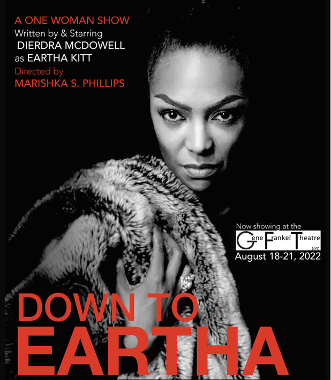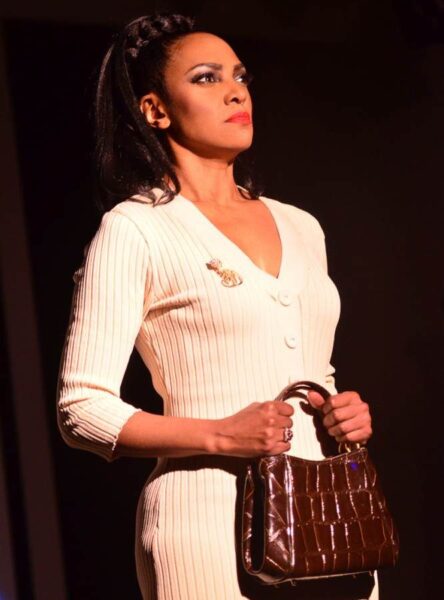EARTHA HAS MOMENTS,
BUT COULD USE A REPAIR KITT
From almost any angle, singer/actress Eartha Kitt was a fascinating person. Born in 1927 into poverty and abuse in the American Deep South, she overcame her hardscrabble early years to become an internationally recognized and lauded performer. She found success in motion pictures, on Broadway, the recording industry, television and on both the domestic and international cabaret circuit. She was also an out-spoken human rights activist at a time when such honesty was frowned upon, especially from a celebrity, let alone a celebrity of color. Her honesty eventually incurred the wrath of both President Lyndon Johnson and his wife, Lady Bird. In 1968, Kitt was invited to attend a White House luncheon along with other notable women of the day. Hosted by the First Lady, the stated reason for the lunch meeting was to discuss ways to help America’s rebelling youth. When asked for her opinion, Kitt matter-of-factly shared her views based on her work with youth around the country, which included unveiled criticism of the war in Vietnam. Shocked by her directness, the President and First Lady consequently made efforts to have her professionally blacklisted. Kitt did not work in the United States for about the next ten years, though she continued to work outside of the country.
Down to Eartha, a one-woman show written by and starring Dierdra McDowell, currently running at The Gene Frankel Theater in New York City, purports to be a deep dive into Ms. Kitt’s amazing life, centered on the 1968 incident at the White House. However, this solo performance, haphazardly directed by Marishka S. Phillips, plays more like a self-indulgent, extended acting exercise that cares little about what the audience is receiving. Unclear if it’s a stylized projection of Kitt’s life or a realistic recreation, the performance offers little take-away about Kitt as a person or reasons why her story should still be important today.
The production seems to believe that Ms. Kitt was little more than her stereotypical mannerisms – the rolled R’s, the feline physicality, the distinctive voice. Considering that Ms. Kitt spoke four languages and sang in eleven, it’s possible that her voice was not just a put-on affectation but also an instrument that developed to the point where it could effectively accommodate all the varied sounds and muscle movements it was called upon to make. However, this production does not provide Ms. Kitt’s life with even so cursory an insight.
Instead, Ms. McDowell seems content to luxuriate in just the surface of Ms. Kitt’s being, beginning with a labored, Norma Desmond-like first entrance to the stage while dressed in middle-eastern (?) garb. The episodes of Kitt’s life that are dramatized in this play seem to have been chosen solely as opportunities to give McDowell reasons to Emote. And Emote she does, at every possible moment, which often leaves the audience losing story (such as it is) and logic in service of McDowell’s histrionics. Director Phillips seems to have little sense of pacing or overall cohesion. What the disparate parts of the show add up to is unclear – even after the overly long, oddly drawn out last performance section where McDowell literally scratches the theater wall as she exits. Not surprising, however, as the show in parts seem to believe that Ms. Kitt was an actual cat — rather than her feline shtick being part of a carefully crafted, professional persona. Meow.
However, there are two sections that work very well, both concerning the incident at the White House. One is a very clever rendition of Kitt’s hit “Santa Baby” with the lyrics changed to reflect the turbulent times and Kitt’s inner feelings as she dresses to attend the luncheon. McDowell’s heightened movement in this song is also quite effective and the sequence is a stand-out. Similarly, the first half of Kitt’s speech to Lady Bird is equally as moving, that is before the second half when someone flipped the “ACT” button. McDowell is a very good actress and when she’s not over-the-top, she’s quite impressive. Due to beautiful make-up by Ruby Perez that successfully recreates Kitt’s look, there are quick flashes in the show when McDowell appears to actually be Kitt. But those are few and far between. As it currently stands, Eartha Kitt deserves much better than Down to Eartha. And so does Dierdra McDowell.
DOWN TO EARTHA
ends on April 21, 2022
Gene Frankel Theatre, 24 Bond St
more info, visit Down to Eartha


